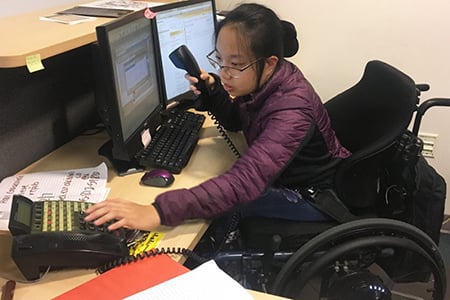Kennedy Center (TN IDDRC, UCEDD, LEND) Receives Grant to Improve Statewide Transition Practices for Youth and Adults with Disabilities
November 23, 2020

|
The Federal Administration for Community Living has awarded a Community-Based Transition Partnership Planning Grant to the Vanderbilt Kennedy Center's (TN IDDRC, UCEDD, LEND) University Center for Excellence in Developmental Disabilities (VKC UCEDD).
The VKC UCEDD, one of 10 UCEDDs awarded, will convene partnerships to develop a framework to ensure community integration, through the creation of a sustainable, high quality, community-based transition pilot. The project is led by Elise McMillan, J.D. (PI, Co-Director), Erik Carter, Ph.D. (co-director), and Ben Schwartzman, Ph.D. (Project Director).
Transitions, including from school to college or work in the community and from pediatric to adult health care providers, can present unique challenges for people with intellectual and developmental disabilities (IDD). A significant challenge is that the transition services and supports currently offered to youth and adults with IDD by school and health systems are often fragmented and difficult to navigate.
The VKC UCEDD will work to improve coordination of transition services by working with two community-based providers, Developmental Services of Dickson and Progress of Nashville; the VKC UCEDD Community Advisory Council; Tennessee Council on Developmental Disabilities; People First of Tennessee; and more than 20 state and local organizations.
"With our partners, we will develop a plan that mirrors on a local level what has been so effective on a state level," said McMillan. "An opportunity for representatives of different transition services to come together regularly and work together for better, more effective supports and services for people with disabilities."
The VKC UCEDD approach integrates work carried out at two levels. First, state-level planning focused on policies, practices, and partnerships that influence transition services across Tennessee, and second, community-level planning focused very specifically on what it would take to improve transition outcomes locally within the specific contexts of a rural and urban county.
"Each of these strands takes place concurrently and is designed to inform the other," said Carter. "State-level reflection should not be carried out in the absence of local considerations and community-level reflection will be insufficient without understanding the resources, policies, and practices of state agencies and programs. As a state, we are committed to the long-haul work required to transform outcomes for all Tennesseans with IDD. Our vision is that young people with IDD experience seamless and successful transitions to all aspects of community life that matter most to them."
The plan will focus on several key outcome areas: employment, postsecondary education, independent living, and health.
"Community integration involves having the opportunities and support to participate in the breadth of activities, experiences, and relationships," said Carter. "These first three outcome areas are regularly named as prominent goals for young people with IDD across our state. Moreover, the areas of working, learning, and living are so inextricably linked that it would be hard to address one without also tackling the others. We also address health transitions because physical and emotional well-being are essential to - and are influenced by - all other outcomes."
The work is all aimed toward developing a flexible, effective process communities can adopt for identifying, integrating, improving, and publicizing the full range of formal and informal supports needed to support successful transitions for residents with disabilities. McMillan and Carter are tentatively calling this the "Whole Community" Transition Model.
"We want to equip rural and urban communities with a better way of bringing together everything young people with IDD might need to transition to the experiences that matter most to them," said McMillan. "We are eager to begin the work and are thrilled to have been selected by the Administration on Disabilities to do so."
Additional project team members include Carol Rabideau, LCSW, VKC Social Worker; and Laurie Fleming, UCEDD Program Manager.







